Fructooligosaccharides, sometimes abbreviated as FOS, are a specific type of carbohydrate that are used by probiotic bacteria to grow and multiply.
For this reason, fructooligosaccharides fall under the umbrella of prebiotics—they are essentially food for probiotic bacteria. FOS supplements provide your digestive system with more of this essential fuel for healthy gut bacteria.
They’re a great compliment to probiotic supplements for alleviating gastrointestinal problems, promoting weight loss, and cutting down on inflammation in your body. Need a good prebiotic to help support healthy gut bacteria? Check our rankings of the best FOS supplements.
Research
Rankings
1. Performance Lab Prebiotic
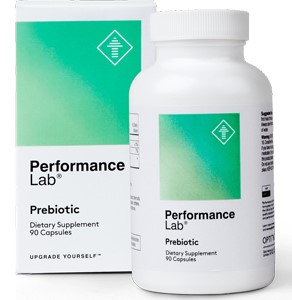
Click here for the lowest price
Performance Lab Prebiotic focuses on a special blend of inulin from chicory root. This naturally-sourced FOS helps foster probiotic bacteria growth both in the stomach and further into the digestive tract.
These ingredients provide 1.7 grams of fiber, and are delivered in a vegan-friendly pullulan capsule. The excellent performance of the inulin and fructooligosaccharides, plus the lack of any ancillary ingredients, propels this supplement to the top of our rankings.
2. Micro Ingredients Organic Chicory Root Inulin Powder
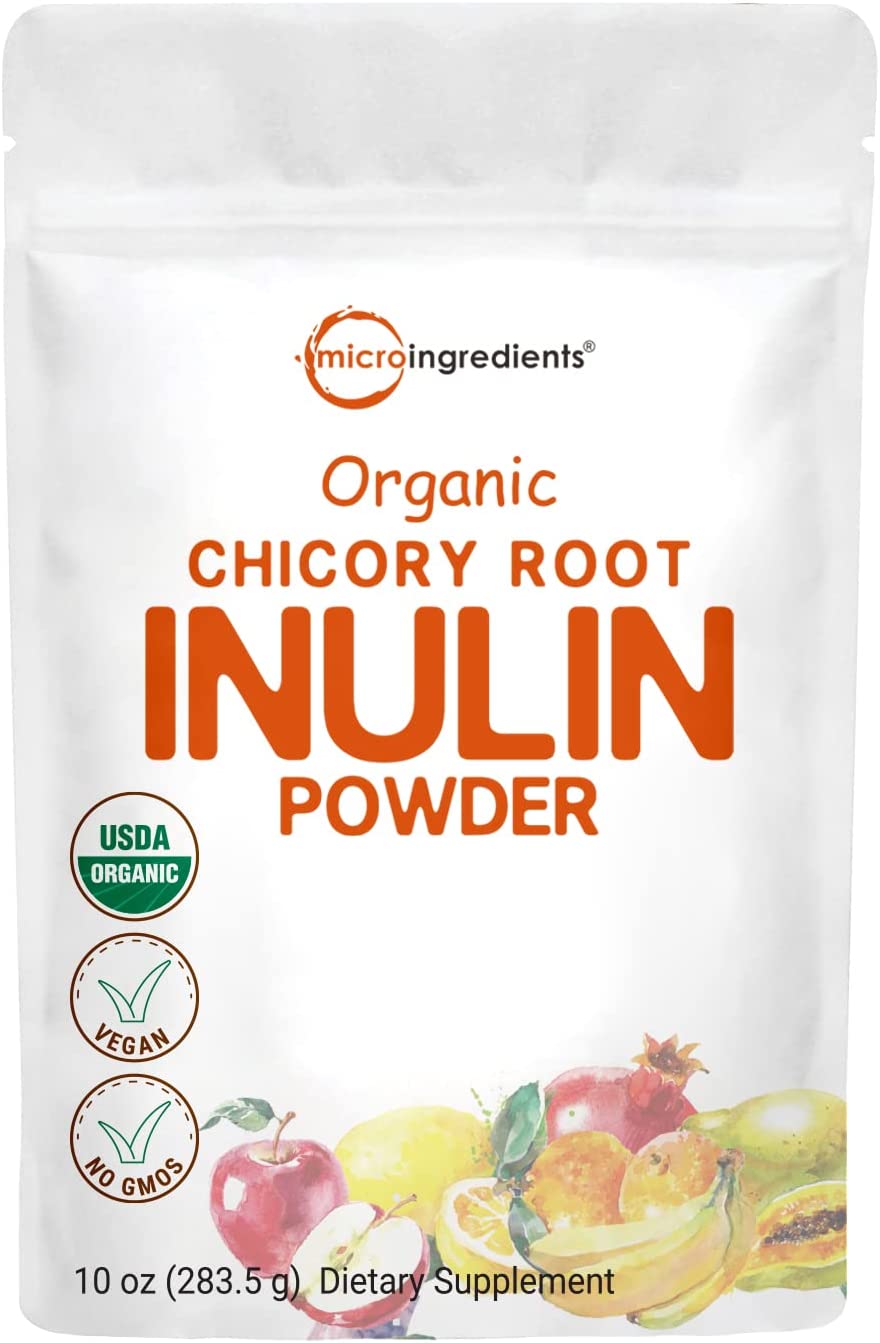
If you want a source of fructooligosaccharides that’s as natural as possible, Micro Ingredients is the way to go. This powdered inulin contains FOS alongside other naturally-occurring carbohydrates and fibers found in raw chicory root.
While it doesn’t have the convenience of capsules, it does give you the flexibility of adjusting the dosage as needed, and it’s the perfect choice for a FOS supplement that’s going to be mixed into protein shakes and smoothies.
3. Layer Origin PureHMO Tri-Prebiotic Powder
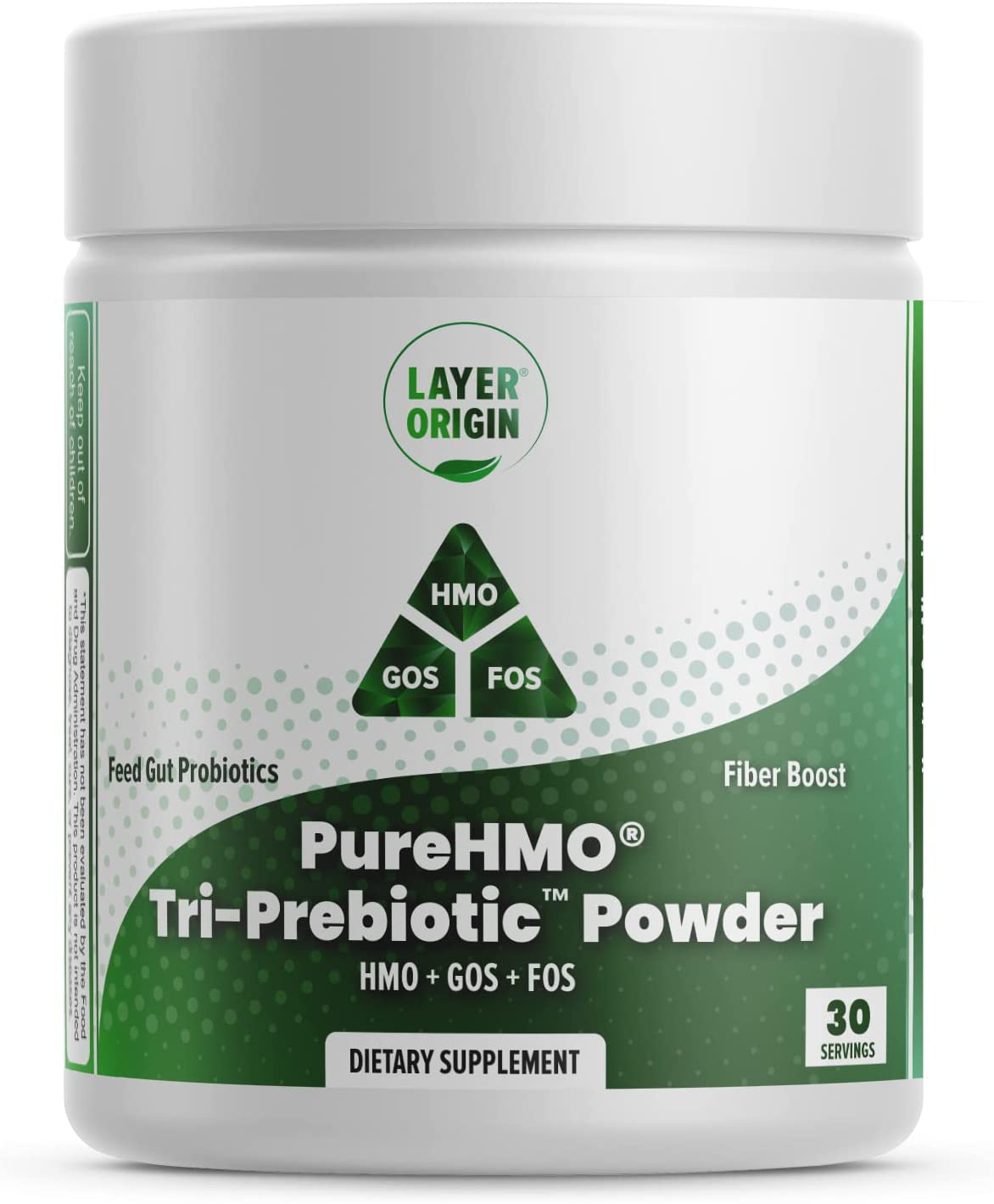
Layer Origin makes a triple-action prebiotic supplement that provides FOS alongside two other powerful prebiotics: human milk oligosaccharide (HMO) and galactooligosaccharides (GLO).
This powder-form prebiotic provides a wider range of nutrients to probiotic bacteria, and is easy to mix into shakes, smoothies, and green drinks, making it a strong overall pick.
4. Namanna Inulin FOS
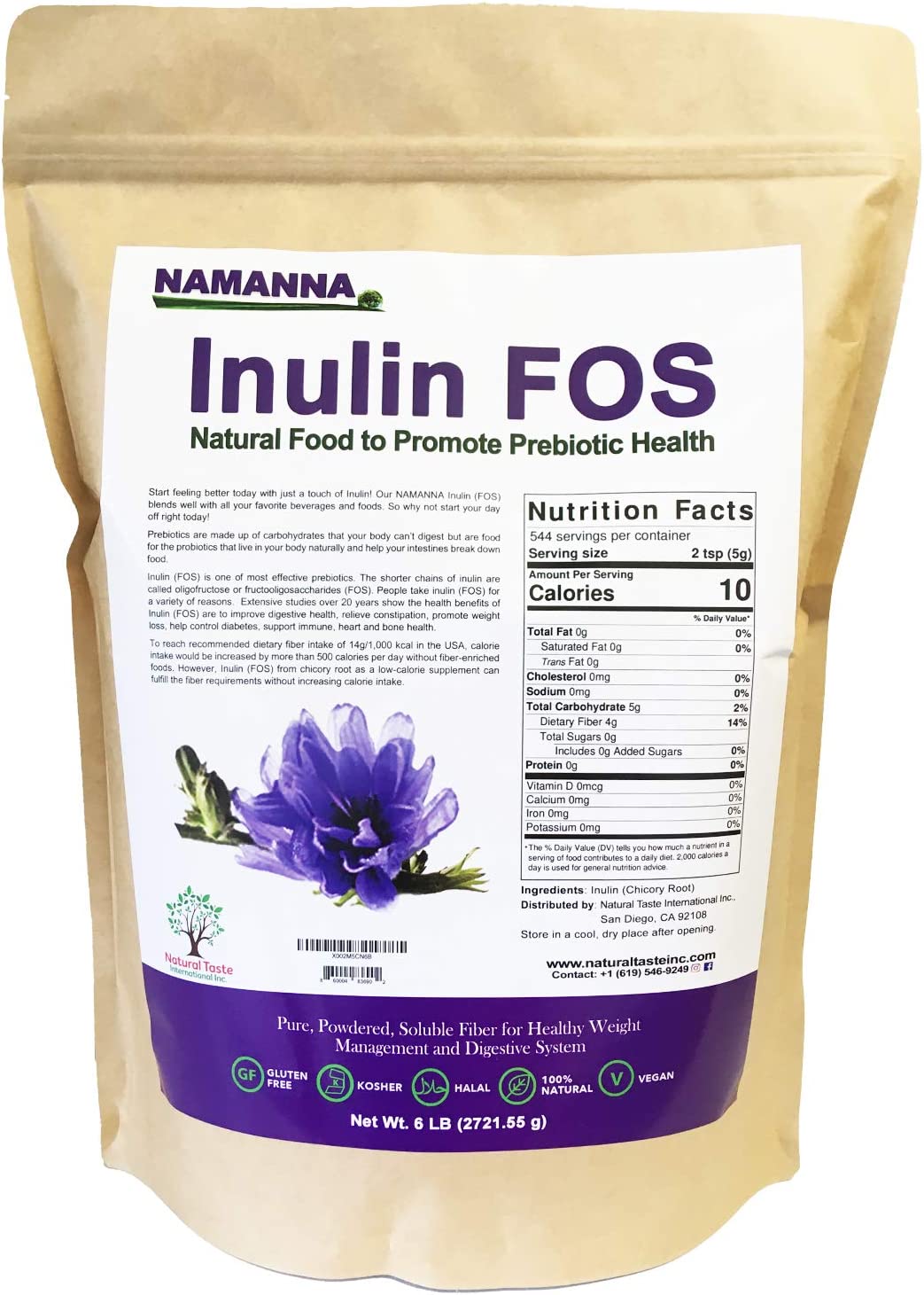
Namana Inulin FOS is a simple, naturally-sourced FOS powder derived from chicory root. It’s a pure and straightforward powder-form source of fructooligosaccharides, though its best feature is its bulk sizing.
You can get up to six pounds of this FOS supplement, making it a great option for people looking to save by buying in bulk. While it’s not organically certified like some of the other powder-form FOS supplements out there, it’s still a great option.
5. Jarrow Formulas Prebiotic Inulin-FOS
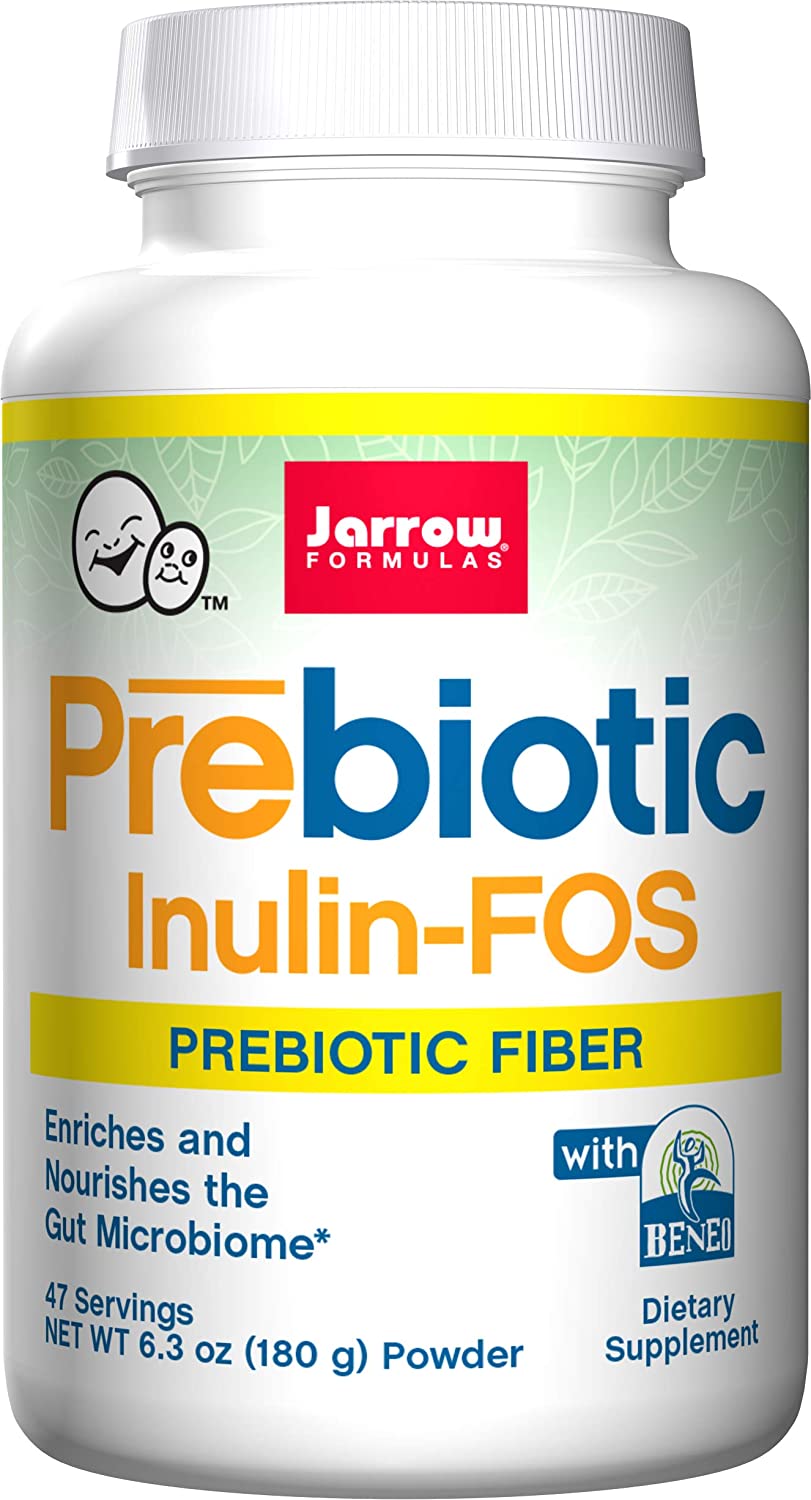
This powder-form prebiotic from Jarrow Formulas is basic but effective. It provides inulin-derived fructooligosaccharides to the tune of three grams per serving, which gives you a solid amount of naturally-sourced fiber with zero extraneous ingredients. If you want a simple but effective powder-form FOS, Jarrow Formulas is a good option.
6. Source Naturals FOS
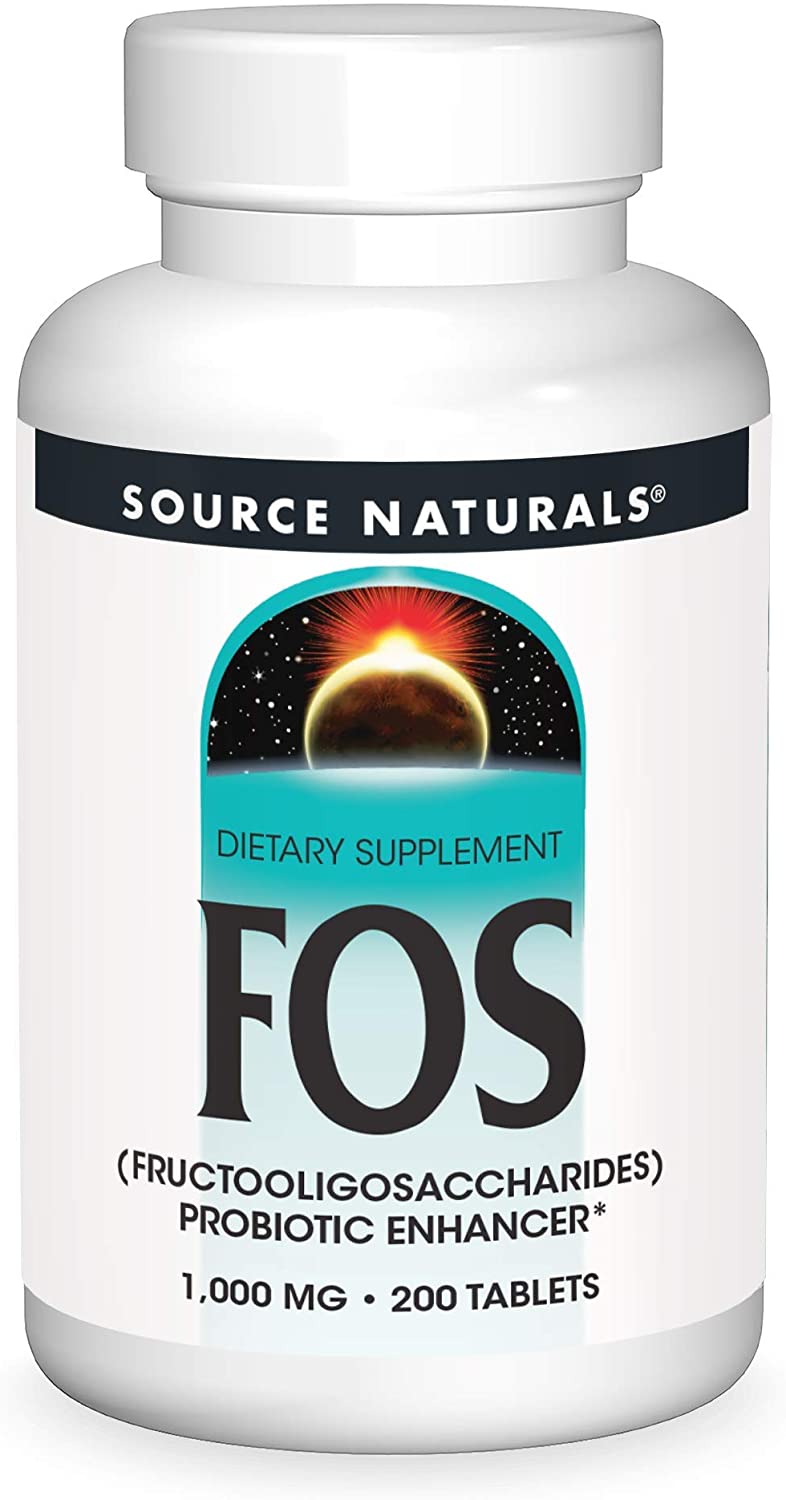
Source Naturals provides a fructooligosaccharide supplement in simple capsule form, each of which provides one gram of FOS.
The simplicity and convenience of these capsules are great, though you don’t get FOS in combination with other naturally-sourced compounds from chicory or inulin, and the capsules do have a few binders and fillers added to them that you won’t see in other competitors.
Nevertheless, it’s a reliable pick if you want a convenient and reliably-measured dosage of FOS.
7. Herbamama Chicory
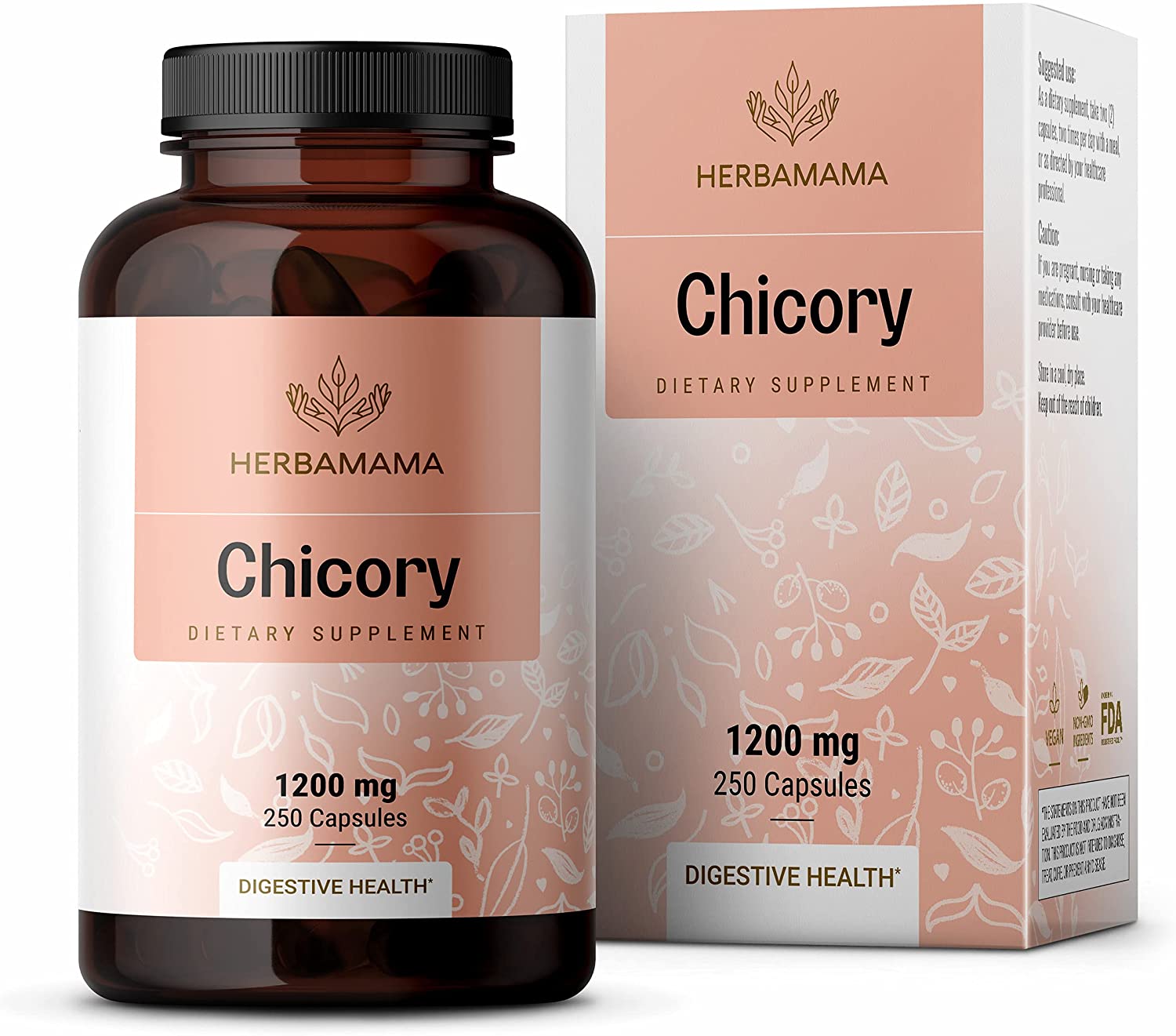
Herbamama fills a niche role in FOS supplements: a raw, all-natural chicory root extract that’s available in capsule form.
Usually, you have to choose between purified and extracted fructooligosaccharides delivered as a capsule, or raw natural sources of FOS, like chicory root, in powder form. It’s a good pick if you want the benefits of raw-sourced FOS, but the convenience of a capsule.
The only downside? The per-capsule dosage is lower than some of its competitors, at only 600 mg, which makes it a poor choice if you need a high dosage of FOS.
8. NOW NutraFlora FOS Powder
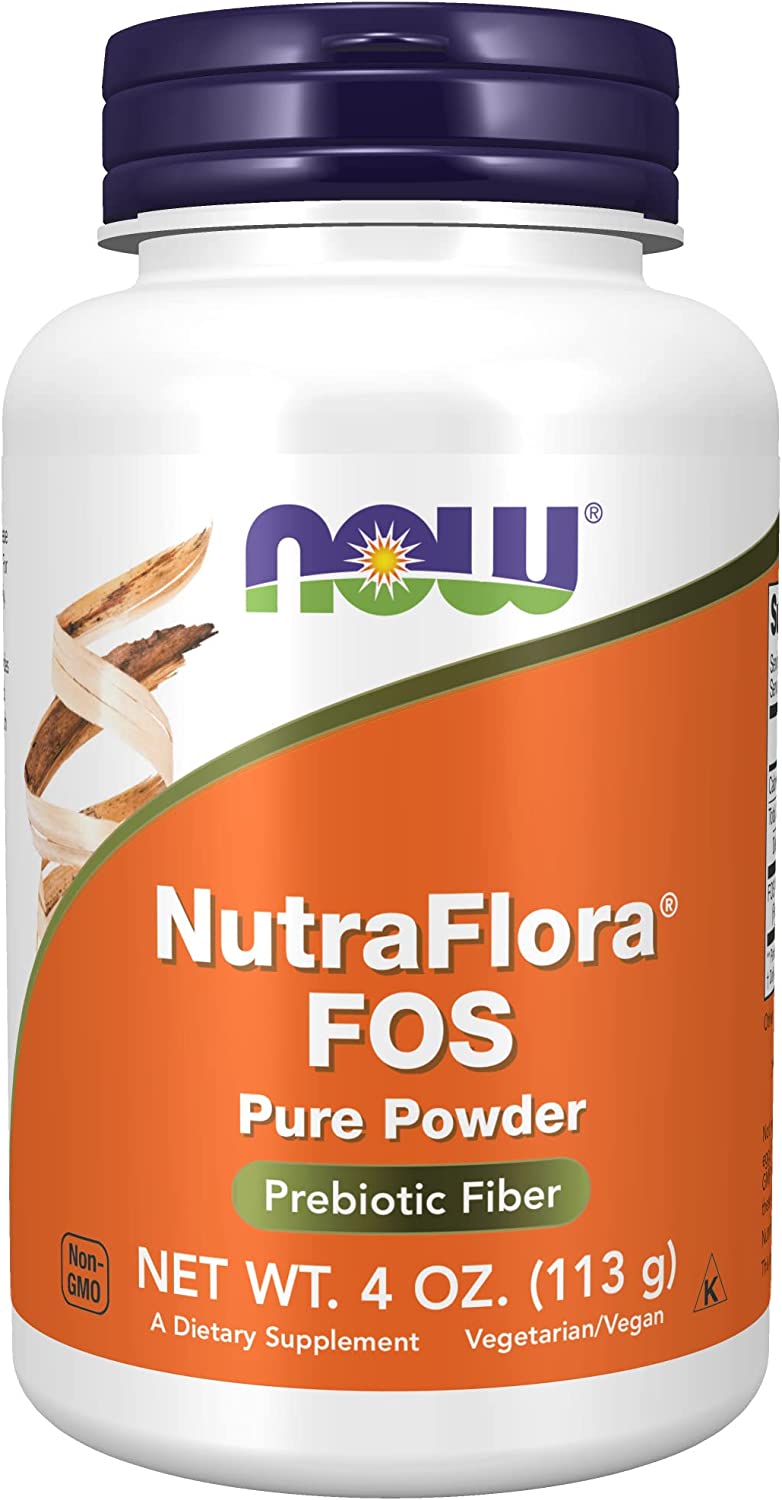
NOW NutraFlora is a single-ingredient source of fructooligosaccharides that comes from chemically processed cane sugar. This powder provides a high dose of FOS, but like other NutraFlora-based prebiotics supplements, it loses points in our rankings for not being naturally derived.
The upside is that you get exactly the FOS and fiber content you measure out—since this supplement is 100% fructooligosaccharides, there are no ancillary ingredients and you can dial in your dosage with precision.
9. Gobiotix Prebiotic Fiber Boost
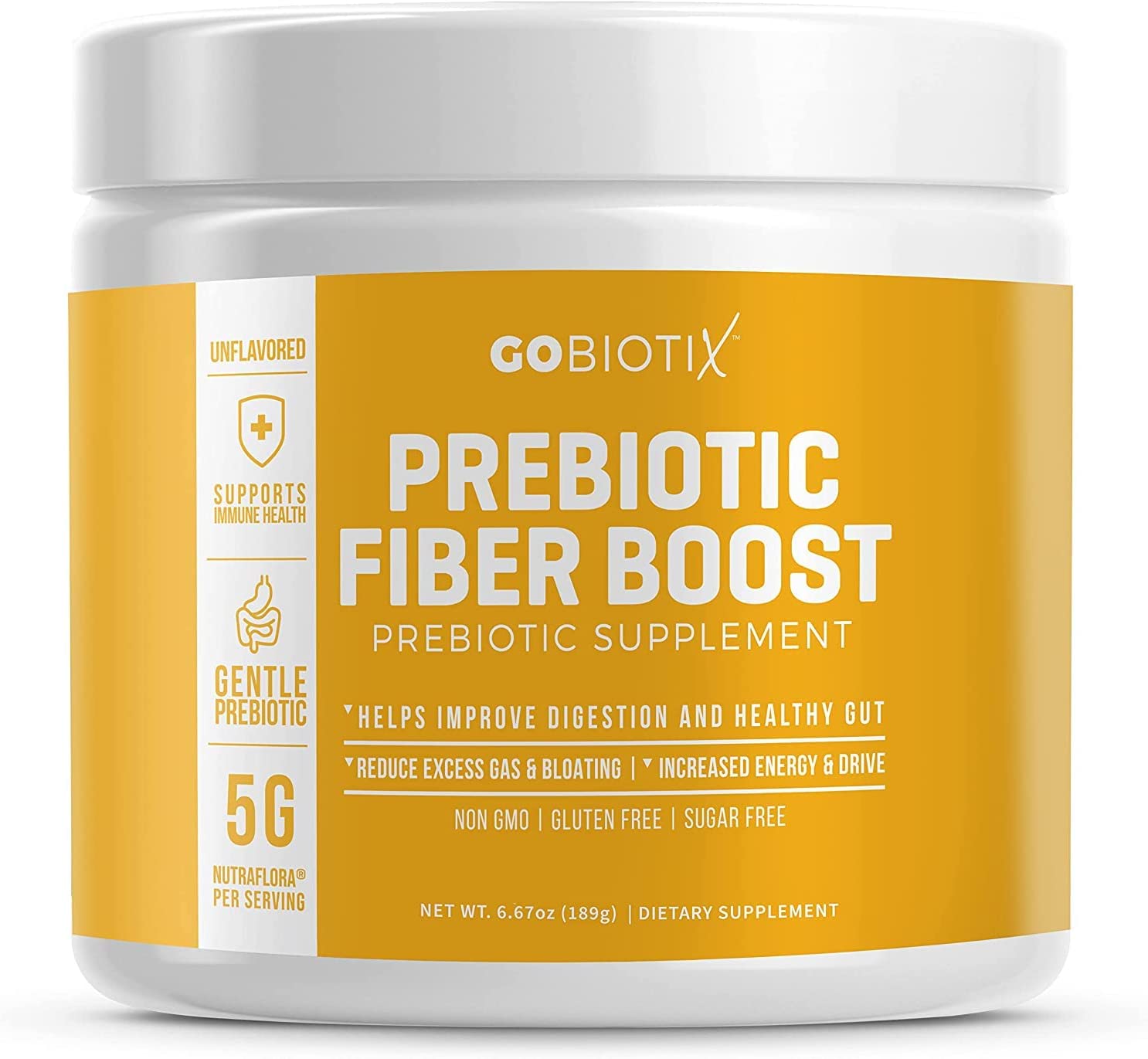
Gobiotix uses a proprietary fructooligosaccharide source called Nutraflora to deliver its prebiotic nutrients. Unlike naturally-sourced FOS found in plant-based compounds like chicory root, Nutraflora FB P-95 (the specific preparation used in this supplement) is synthesized by fusing together cane sugar molecules.
This has the upside of making the actual sugar content zero, but means this FOS supplement is in a bit of a different category than its naturally-sourced competitors. This sourcing, plus the presence of silicon dioxide as an anti-caking agent, knocks it down in our rankings.
10. Gogo Prebiotic Fiber Gummies
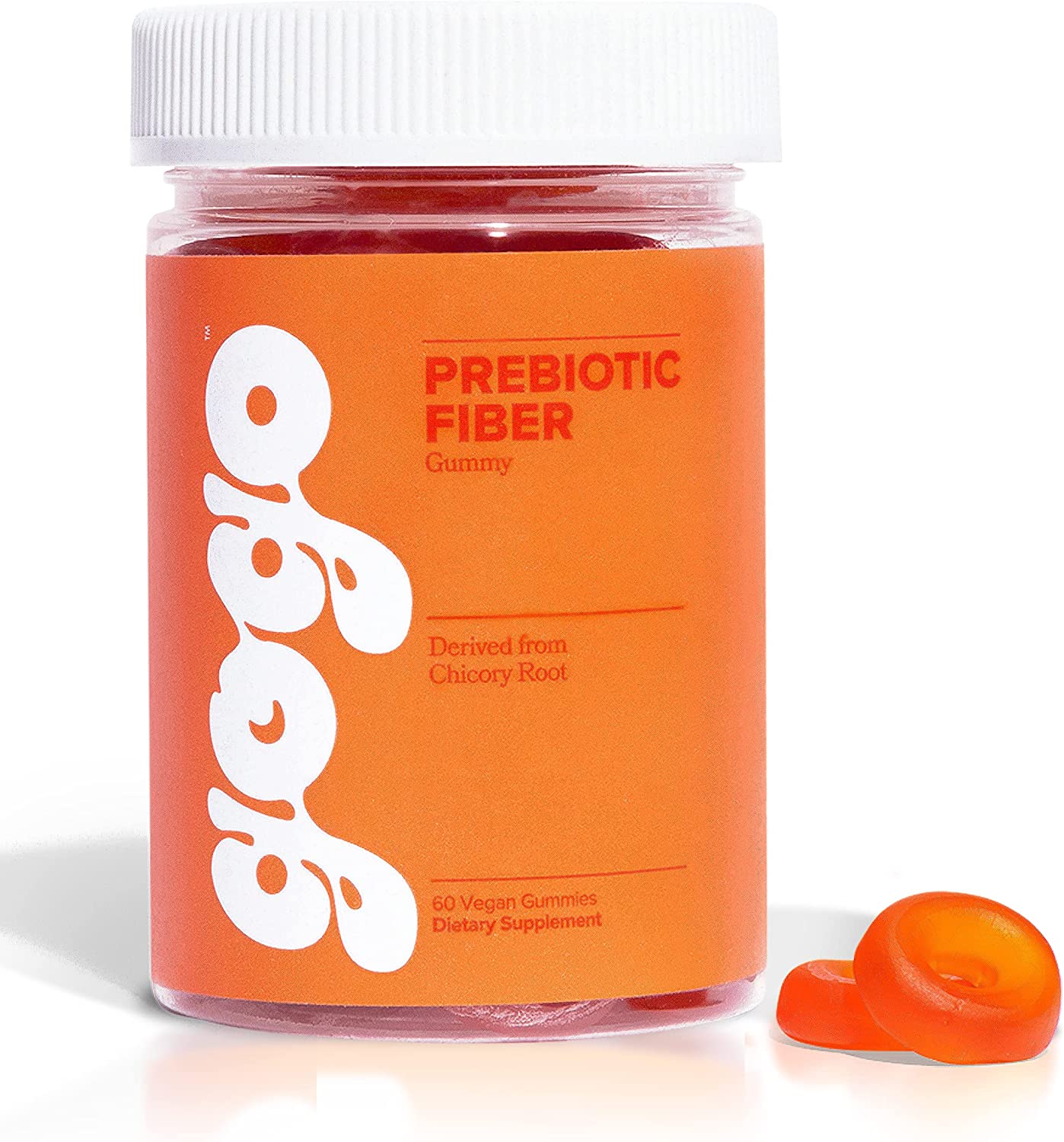
Gogo Prebiotic Fiber is unusual among FOS supplements in that it comes in gummy form.
This delivery format is useful for people who don’t like taking prebiotics the usual way (as a capsule or in powder mixed into a drink or smoothie), but the downside is that the dosage of fructooligosaccharides is smaller than many of its more traditional competitors.
On top of that, each gummy serving contains 2 grams of sugar–not much, but that’s a 2:3 ratio of sugar to fiber, which isn’t the best.
Given these weaknesses, Gogo Prebiotic Fiber Gummies are only suited for the pretty narrow niche of people who want to take FOS in gummy form. Most users would be better-served by some of the alternatives on the market.
Category winners
Best FOS overall: Performance Lab Prebiotic
Performance Lab takes our top spot thanks to its excellent-quality inulin-derived fructooligosaccharides.
Unlike many of its competitors, it provides naturally-sourced FOS, with all of the ancillary benefits that come from the raw chicory root material that produces the fructooligosaccharides.
Add to that the convenience of a capsule-based FOS supplement and you’ve got an excellent all-around pick.
Best fructooligosaccharides for weight loss: Micro Ingredients Chicory Root Inulin Powder
Fructooligosaccharides help with weight loss on two fronts: first, they help promote a healthy gut microbiome, and second, they directly reduce hunger cravings thanks to their fiber content.
Micro Ingredients is our pick when it comes to weight loss, thanks to its naturally-sourced inulin powder and the ease of dialing in the dosage to deliver enough fiber to keep your hunger under control. When paired with a good probiotic, it’s the perfect option for weight loss.
Best FOS for digestive health: Performance Lab Prebiotic
Promoting digestive health by supporting healthy populations of probiotic bacteria is one of the core functions of FOS supplements, so it should be no surprise that our top pick, Performance Lab Prebiotic, shines in this role.
Its inulin-based FOS is perfect for supporting the growth of a wide range of probiotic bacteria, and thanks to its high dosage capsules, it’s easy to incorporate into your larger supplementation routine.
Best FOS for probiotic smoothies and green drinks: Layer Origin PureHMO Tri-Prebiotic Powder
Layer Origin is our favorite FOS supplement for probiotic smoothies thanks to its multi-ingredient prebiotic mix.
You get fructooligosaccharides alongside HMO and GLO, two other potent oligosaccharides that support the growth of any number of probiotics that you might add to your smoothies and green drinks.
It’s the best option for maximizing the range of probiotic nutrients in your custom-mixed health drinks.
Best FOS to take with a probiotic supplement: Performance Lab Prebiotic
Prebiotic supplements partner very well with probiotics, and when it comes to combining the two, it couldn’t be easier than with Performance Lab Prebiotic.
It delivers high-quality fructooligosaccharides in a capsule that can be taken alongside any good probiotic to enhance its efficacy and sustain higher levels of beneficial bacteria in your digestive tract.
Best FOS for appetite control: Micro Ingredients Organic Chicory Root Inulin Powder
Micro Ingredients is our pick for controlling appetite and fighting hunger thanks to its high levels of fiber and its naturally-derived fructooligosaccharides.
This powder form supplement makes it easy to dial in the dosage you need, and its naturally-sourced chicory root FOS delivers probiotic nutrients with unparalleled purity.
Who should buy fructooligosaccharides?
Fructooligosaccharides directly support building high levels of healthy bacteria in your gastrointestinal tract. As such, it’s not surprising that they’re useful for many of the same things you’d take a probiotic supplement for, like gastrointestinal and digestive problems.
However, because probiotic bacteria influence so many aspects of your body’s function, FOS supplements are also useful for applications like weight loss, reducing inflammation, and even improving mental wellbeing (since many neurotransmitters are synthesized in the gastrointestinal tract).
Usually, unless you’re already confident about the probiotic bacteria in your body and in your diet, you’ll take fructooligosaccharides alongside a probiotic supplement tailored for your specific needs. Ideally this would be a high-CFU (colony forming units, the dosing unit for probiotics) supplement that includes several strains of probiotic bacteria.
Once you have a regular probiotic intake, either from a supplement or probiotic-rich foods like kombucha, kimchi, yogurt, and miso, you can add in a FOS supplement to help accelerate their growth.
Prebiotics like FOS go well alongside probiotics as part of a supplementation strategy for weight loss, thanks to the role that probiotic bacteria and fiber play in your body’s feelings of satiety and fullness.
Because FOS are digestible by bacteria but not by your own digestive tract, they also function as fiber supplements, helping you feel more full and cutting down on hunger cravings.
Another more niche use case for FOS is for people taking antibiotics. Antibiotics are excellent for clearing up infections, but an increasing number of doctors are recommending probiotic and prebiotic supplements (in combination) during or after a course of antibiotics to help rebuild your body’s population of healthy gut bacteria.
Some of the negative gastrointestinal side effects of antibiotics can be attributed to the fact that they indiscriminately kill off both healthy and disease-causing bacteria.
So, a FOS supplement alongside a good probiotic supplement might help restore your gut health after taking antibiotics.
However, this use case is controversial, with some doctors expressing concern about introducing new bacteria to the body quickly following the use of an antibiotic (1).
How we ranked
Fructooligosaccharides can be delivered in a variety of ways: capsules, powders, and gummies, to name just a few. Additionally, you can get FOS by itself, or in combination with other prebiotic compounds.
We took all of these possibilities into account in a systematic way when building our rankings: first, we sorted a wide range of products into different categories based on their FOS delivery mechanism, with each category having slightly different ranking priorities.
For fructooligosaccharide supplements that come in powder form, we put an especially high premium on purity. We preferred fructooligosaccharides that were derived naturally from inulin extracted from chicory root, as opposed to synthetic FOS from fused sugar molecules.
We also gave extra points to powder form FOS supplements that delivered FOS alongside other prebiotic compounds.
This helped propel products like Layer Origin PureHMO towards the top of this category, thanks to its triple-ingredient prebiotic formulation.
Purity helped lift Micro Ingredients high in the rankings, thanks to its organically-sourced inulin from raw chicory root. In contrast, products that used synthetic FOS, like Gobiotix, ended up lower in our rankings.
For capsule-based compounds, both purity and dosage made a big difference in our rankings. Some FOS supplements that come in capsules are delivered in pretty low doses, which hurts their ability to fortify your probiotic bacteria populations.
High-dosage products that deliver pure, naturally-sourced FOS, like Performance Lab Prebiotic, scored well in this category, while lower dose options like Herbamama fell lower in our list (and the lowest dose options got dropped completely).
Gummies had a hard time making our rankings because their convenience is offset by both their lower dosage and, by necessity of the gummy formulation, their worse purity. Because of these disadvantages, only one gummy FOS supplement made our list, and it was at the bottom.
While gummies are useful for kids and for older adults who don’t want to have to swallow yet another pill every day, most users are better served by drinks made from FOS powder or FOS capsules.
The delivery mechanism also factored into how we brought together product categories to form our overall rankings. We combined the separate rankings for each category of supplement by weighting both the quality and the convenience of use for the average user.
For many people, the convenience of capsules and the purity and dosage flexibility of powders makes these two options pretty competitive with each other, so our top-rated supplements contained a mix of both capsules and powders.
As discussed above, gummies faced significant challenges on the dosage and purity fronts, which put the only gummy FOS supplement at the bottom of our rankings.
After combining all three types of FOS supplements and ranking them by their weighted quality, this left us with our final rankings of the best fructooligosaccharides available on the market right now.
Benefits
Fructooligosaccharide supplements can help reduce bloating and gas. Gastrointestinal complaints like bloating and gas are one of the most popular applications of both prebiotic and probiotic supplements, since having more healthy bacteria can cut down generation of gas in your digestive tract (which is the root cause of bloating).
A scientific article published in 2022 by Jordi Serra at the University Hospital Vall d’Hebrón in Spain reviewed the treatment options for bloating and highlighted the potential of probiotics and prebiotics like FOS in the treatment of persistent bloating (2).
By modifying the population of gut bacteria inside your gastrointestinal tract, FOS supplements are thought to improve your ability to digest foods that would otherwise cause excessive gas and bloating.
FOS supplements increase the levels of beneficial bifidobacteria in the body. The stated purpose of FOS supplements and other prebiotics is to increase the levels of beneficial bacteria in your digestive tract, but do they really work?
A meta-analysis of 11 studies published in 2019 in the American Journal of Clinical Nutrition set out to answer this question by examining studies on adults with irritable bowel syndrome (3).
After pooling the results of these different studies, the results showed that taking a prebiotic supplement does lead to a significant increase in levels of bifidobacterium in the body–bifidobacterium being one of the most commonly-studied strains of probiotic bacteria.
However, the results on symptoms of irritable bowel syndrome were more varied, with no significant improvements in overall quality of life in people with IBS compared to those in placebo groups–notably, though, these studies examined a wide range of prebiotics, and not all of them included the same set of probiotics alongside the prebiotic supplements, which might explain these discrepancies.
Fructooligosaccharides can improve the gut microbiome of older adults. Gastrointestinal problems become more common as you get older, and one proposed cause is the decrease in microbiome diversity and levels of beneficial bacteria that happens with aging.
Prebiotic supplements like FOS are one possible avenue for reversing this decrease. A study published by researchers in Greece, Italy, and the United Kingdom and published in 2014 in the scientific journal Anaerobe investigated a range of probiotic, synbiotic, and prebiotic supplements for their ability to affect the microbiome populations in elderly subjects (4).
Using a pool of elderly volunteers, the researchers used fecal samples to investigate changes in the gut microbiome after several different supplements, including FOS. The results showed that both lactobacillus and bifidobacterium counts increased significantly at both five and ten hours post-ingestion of the supplement.
These results indicate that older adults could see significant benefits in the health of their gut microbiome after taking a FOS supplement.
Taking a FOS supplement can help improve constipation. Constipation is another common gastrointestinal complaint that’s linked with gut microbiome health.
One study published in 2000 in the journal Nutrition Research examined the ability of a low-dose FOS supplementation routine to improve bowel function in constipated men (5). The study involved five subjects who completed a low-fiber control diet for one month, then a 30-day intervention where their diet was supplemented with ten grams of fructooligosaccharides each day.
The researchers collected fecal samples over the final five days of each observational period and compared the stool weight and fatty acid content of the fecal samples.
The results showed that constipation decreased significantly and stool weight increased significantly during the FOS intervention compared to the low-fiber control period.
Additionally, the concentration of short-chain fatty acids in stool (a marker of gastrointestinal health) increased by up to 18-fold when the subjects were taking FOS compared to the control period.
The findings of this study suggest that a FOS supplement is a great choice if you have constipation or poor-quality bowel movements, particularly if your diet is low in fiber to begin with.
Fructooligosaccharide supplements might help with weight loss. Feelings of hunger and satiety are modulated significantly by probiotic bacteria, as are the digestion process itself.
For these reasons, supplements that affect probiotic bacteria levels, like fructooligosaccharides and other prebiotics, have attracted a lot of attention for their potential weight loss benefits. One review study published in the Annals of Nutrition and Metabolism in 2013 examined the range of human studies to date on FOS and its potential weight loss benefits (6).
The results were varied, since there are so many potential ways in which a prebiotic supplement could contribute to weight loss, including direct reductions in body mass, changes in body composition, and decreases in appetite and hunger, to name just a few examples.
Still, the study found some limited evidence that fructooligosaccharide supplementation taken over long durations (one year or more) could lead to significant decreases in body mass index.
A prebiotic like FOS might help boost your mood and improve mental wellness. One of the most exciting avenues of research in nutrition is the connection between gut bacteria and mental health, including conditions like depression and anxiety.
Some emerging research suggests a strong connection between gut bacteria and mood: for example, about 95 percent of the body’s serotonin is synthesized in the gut (7).
Research into the ability of prebiotic supplements to affect mood is just beginning. According to a review of the current state of the field by a team of researchers in Iran and published in the journal Clinical Nutrition in 2020, some research has indicated that specific probiotic bacteria strains can boost mood and improve depression, though the research on prebiotics like FOS is much more scarce (8).
While there’s still a need for more research, the potential for FOS supplements being a simple and effective way to boost mood is very exciting: if the specific probiotic bacteria that boost mood most effectively can be identified, these probiotics might be able to be combined with a prebiotic for FOS for even better outcomes.
Side effects
Fructooligosaccharide supplements might cause some bloating and gas in the first few days as you get adjusted to different levels of probiotics. While FOS supplements can make a big improvement long-term for people who have bloating, gas, and indigestion, it can take a few days for your body to get adjusted to the new levels of the various probiotic bacteria in your digestive tract that are feeding off the prebiotic nutrients in FOS.
During this time, you might experience some bloating and gas. In most cases, though, this subsides after a few days, and you can expect to see significant improvements in your gastrointestinal symptoms thereafter, as the levels of beneficial probiotic bacteria in your body increase.
If you are immunocompromised, you should talk to your doctor before taking a probiotic or prebiotic supplement like FOS. Probiotic and prebiotic supplements are some of the safest supplements you can buy, and they’ve been extensively tested in clinical trials.
Still, since these supplements can affect the levels of beneficial bacteria inside your body, some doctors recommend talking to your physician before taking a supplement like FOS if you are immunocompromised(for example, if you have had an organ transplant, cancer treatment, or HIV) (9).
Even so, the latest research does indicate that probiotic-oriented supplements are safe for immunocompromised people.
A study published in 2015 in the journal Beneficial Microbes that evaluated 57 different clinical trials concluded that the rate of adverse events was actually lower in immunocompromised people taking probiotics compared to the rate in healthy individuals taking probiotics, which is a promising finding that suggests supplements like FOS are safe even for these kinds of special populations (10). Still, it’s a good idea to consult with your doctor first.
Fructooligosaccharides are not compatible with the FODMAPs diet. Some people with irritable digestive tracts have had success cutting out a specific category of nutrients known as FODMAPs.
This stands for fermentable oligosaccharides, disaccharides, monosaccharides and polyols, and some particularly sensitive people find that these types of carbohydrates cause cramping, diarrhea, bloating, and other gastrointestinal symptoms.
The FODMAPs diet is particularly popular among people with conditions like Crohn’s disease, irritable bowel syndrome (IBS), and ulcerative colitis.
Unfortunately, the “FO” in FODMAPs (fermentable oligosaccharides) includes fructooligosaccharides, which means these supplements are a no-go for people on the FODMAPS diet.
If FOS supplements give you cramps, diarrhea, abdominal pain, and bloating, you might have FODMAP sensitivity. Usually, fructooligosaccharide supplements improve gastrointestinal health and cut down on problems like bloating, diarrhea, cramps, and abdominal pain.
But if you notice a significant uptick in these symptoms after taking a FOS supplement, you might have an unrecognized sensitivity to FODMAP carbohydrates, and should not use a FOS supplement.
Recommended dosage
FOS is found in small amounts in a typical diet; one paper pegs the daily intake of FOS at one to four grams per day for the typical American diet, and three to 11 grams per day in the typical European diet (11).
These levels provide a good floor boundary for appropriate FOS dosage: to experience significant effects, you’ll likely need to boost your intake above these background levels.
Indeed, the typical study that investigates the benefits of FOS uses dosage levels ranging between 10 and 40 grams per day total (12,13,14).
This range is also approximately equal to the amount recommended by a review study published by researchers in Spain in the Journal of Physiology and Biochemistry, which recommends supplemental doses of four to 15 grams per day for improved gastrointestinal health and for combating constipation (15).
Fructooligosaccharides pass through the digestive tract nearly untouched by the body (instead, they serve as food and substrate for bacteria), so absorption dynamics are not relevant for FOS supplements like they typically would be for a bioactive supplement.
For this reason, you can either break up your FOS dosage into smaller pieces to take throughout the day, or take it as one bolus in the morning or in the evening.
Especially at higher doses of FOS, the fiber content will start inducing effects on your satiety and gastric motility (i.e. frequency of a bowel movement), so you may want to adjust your timing during the day to maximize the benefits.
For example, if you want the satiety-inducing effects of FOS for weight loss, taking your FOS supplement in the morning or early afternoon would be better than taking it at night. The opposite is true if you are looking for more regular bowel movements: taking your FOS supplement before bed would be a better option in that case.
FAQ
Q: What foods are rich in fructooligosaccharides?
A: Fructooligosaccharides can be found in whole wheat, onions, bananas, garlic, and leek, as reported by a chapter on prebiotics, synbiotics, and colonic foods in the Textbook of Natural Medicine (16).
A typical healthy diet might contain ten grams per day of FOS or more, but to get to the higher end of FOS dosage that’s typically seen in clinical studies on the benefits of prebiotic supplements, the easiest way is with a dedicated fructooligosaccharide supplement.
Q: Are fructooligosaccharides compatible with the FODMAPS diet?
A: No, the “FO” in FODMAPs stands for “fermentable oligosaccharide,” and as you might guess from the name, fructooligosaccharides are a certain type of oligosaccharide.
The “Fermentable” essentially means “digestible by bacteria,” which of course is the entire purpose of taking a FOS supplement. So, if you are sensitive to FODMAPs or are on a low-FODMAP diet, you should not take a FOS supplement.
Q: Are fructooligosaccharides the same thing as inulin fiber?
A: Fructooligosaccharides can be found in inulin fiber, but inulin also contains other polysaccharides that function as fibers as well.
You can get a raw inulin supplement that will provide a range of polysaccharides including fructooligosaccharides, but for the highest concentration you’ll want a dedicated fructooligosaccharide supplement that gets this specific form of carbohydrate by purifying the polysaccharides in inulin.
Many of our top-rated supplements derive their fructooligosaccharides by purifying inulin fiber.
Q: Are fructooligosaccharides the same thing as chicory root?
A: Chicory root is high in fructooligosaccharides, but contains additional compounds alongside fructooligosaccharides.
Chicory root is extracted from the common chicory plant, and contains a high concentration of inulin fiber, which the plant uses as a way to store energy.
Inulin can be extracted from chicory root; inulin, in turn, contains several different polysaccharides, one of which is fructooligosaccharide or FOS. As with inulin, chicory root is a common source of fructooligosaccharides in our top-rated supplements, but it does need to be purified first.
Q: Where do fructooligosaccharides come from?
A: Fructooligosaccharides in supplements usually come from one of two sources. Naturally-sourced fructooligosaccharides can be extracted from plant material, most commonly the chicory plant.
This plant has roots that are rich in inulin, which contains a mixture of complex polysaccharides, one of which is fructooligosaccharides.
By purifying inulin from chicory root, fructooligosaccharides can be sourced 100% naturally. Some supplements instead choose to synthesize fructooligosaccharides by fusing together simple sugars through a series of chemical reactions.
When generating our rankings, we preferred FOS supplements made by this first method, since it involves less processing.
Q: How do FOS supplements help with weight loss?
A: A FOS supplement can help with weight loss primarily through modifying your gut bacteria population and reducing feelings of hunger and appetite due to its fiber content.
Though the scientific evidence is still sparse and conflicting, there is some evidence suggesting that FOS supplements can reduce BMI when taken over long periods (a year or more) (17).
The changes in appetite have a clear connection with reduced weight loss, but research is still ongoing on how changes in gut microbiome content affects weight loss.
It’s well-known that healthy people have a different gut microbiome makeup compared to obese individuals (18), and these differences are though to affect everything from hormone production to nutrient absorption.
Q: Why are fructooligosaccharides in prebiotic supplements?
A: Fructooligosachharides are included in prebiotic supplements because they are a very effective source of nutrients for beneficial bacteria, but cannot be digested by your body.
This second point is very important, because often the usual nutrients that are digestible, like simple carbohydrates, protein, and fat, get rapidly absorbed by your body.
Probiotic bacteria thrive on difficult to digest compounds like fiber, which includes fructooligosaccharides. By providing probiotic bacteria with the nutrients they need to grow and multiply, you can increase the efficacy of the probiotic bacteria already in your body, or the efficacy of a probiotic supplement.
Q: Can you take fructooligosaccharides without probiotics?
A: Yes, taking fructooligosaccharides without a probiotic supplement will still boost the levels of beneficial bacteria that are already in your gastrointestinal tract.
This might work if you already have high levels of good bacteria, or if you have a diet that’s high in probiotic-containing foods like kimchi, cheese, kombucha, and yogurt, and kefir.
However, for best results, most people take a fructooligosaccharide supplement alongside a probiotic supplement, at least initially.
Taking a probiotic with a high CFU count (meaning colony-forming units of bacteria) gives you a jump-start on establishing healthy colonies of probiotic bacteria, meaning you can expect better results sooner when you take a FOS supplement alongside a probiotic.
Q: Should you take fructooligosaccharides with antibiotics?
A: After a course of antibiotics, it’s becoming increasingly popular to take a supplement with probiotic bacteria to replenish the healthy bacteria in your gastrointestinal tract.
However, this approach is somewhat controversial, with some scientists expressing concern that introducing new bacteria could facilitate the exchange of genes for antibiotic resistance (19).
Whether this is a concern with prebiotics like fructooligosaccharides is more of an open question, since you aren’t introducing any new bacteria into your body–it’s a good idea to ask the doctor who prescribed your antibiotics whether taking probiotics or a prebiotic like fructooligosaccharides is a good idea.
Q: How long does it take for fructooligosaccharides to work?
A: Fructooligosaccharides start having a detectable impact on gut function pretty quickly (within a few hours), but since it takes a while for gut microbiomes to change, you shouldn’t expect to see the full benefits from a FOS supplement for about a month.
Most research on the efficacy of FOS supplements doesn’t even bother evaluating the outcome of interest (e.g. gastrointestinal health) until at least four weeks after starting the supplement (20). Some beneficial effects, like weight change, might not appear for several months.
Related articles
Recap
Fructooligosaccharides are a special type of fiber that healthy bacteria in your digestive tract can use for food, which helps them multiply and populate your gut with a strong population of probiotic bacteria.
For this reason, they’re a great choice for people looking to augment their supplementation routine to help improve gastrointestinal health, promote weight loss, and cut down on inflammation.
While people on specialized diets like the FODMAPs diet shouldn’t take an FOS supplement, they’re a great compliment to a good probiotic supplement or a diet that’s high in fermented foods.
When you provide your body with probiotic bacteria and the food that these bacteria need to multiply, you give yourself the best shot at better digestive health, less inflammation, and a stronger population of healthy bacteria in your body.
For BodyNutrition‘s #1 fructooligosaccharide recommendation, click here.